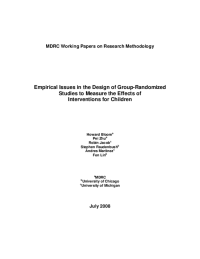Empirical Issues in the Design of Group-Randomized Studies to Measure the Effects of Interventions for Children
This working paper provides practical guidance for researchers who are designing studies that randomize groups to measure the impacts of interventions on children. To do so, the paper: (1) provides new empirical information about the values of parameters that influence the precision of impact estimates (intra-class correlations and R-squares); (2) examines the implications of planning group-randomized studies for three-level hierarchical situations, using empirical information obtained by estimating two-level hierarchical models (which under many conditions appears to not be problematic); and (3) assesses the implications of the uncertainty that exists when the design of group-randomized studies is based on estimates of intra-class correlations. Data for the paper come from two studies: the Chicago Literacy Initiative: Making Better Early Readers study (CLIMBERs) and the School Breakfast Pilot Project (SBPP). The analysis sample from CLIMBERs comprised 430 4-year-old children from 47 preschool classrooms in 23 Chicago public schools. The analysis sample from the SBPP study comprised 1,151 third-graders from 233 classrooms in 111 schools in six school districts.







